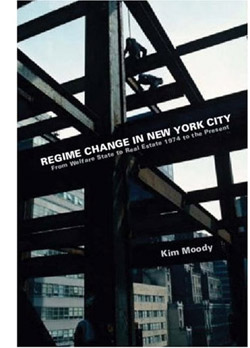« MISSING: Candidate Marty Markowitz | Main | The End of Summer, And What To Expect In the Fall »
September 5, 2007
NYC: JUST ANOTHER BANANA REPUBLIC
The city is different than it used to be, and you're probably not benefiting from the changes, says a well-known labor writer in his new book
City Limits
By Eileen Markey
 From Welfare State to Real Estate: Regime Change in New York City, 1974 to the Present, by Kim Moody, The New Press, $26.95.
From Welfare State to Real Estate: Regime Change in New York City, 1974 to the Present, by Kim Moody, The New Press, $26.95.
It’s a rare occurrence these days that something called a “welfare state” is remembered fondly, but Kim Moody does just that in this analysis of a generation of fiscal and economic policy in New York City. In this thoroughly researched and enlightening book, Moody argues New York was the target of a "structural adjustment program" established when business elites grabbed the reins of governance during the fiscal crisis of the 1970s.
In "Welfare State," Moody, a labor economist and activist who taught labor studies at Cornell University and is now a research fellow at the Centre for Research in Employment Studies at University of Hertfordshire, finds a telling connection between the global financial capital and developing countries.
...
Ever since the Financial Control Board in 1975 imposed “fiscal discipline” on a city that had been operating like a western European social democracy, New York has been run for the benefit of big business, Moody contends. This movement is most dramatically exemplified by the scourge of “developmentalism,” in which city government functions are sublimated to the priorities of mammoth development projects, á la the once and future World Trade Center, Atlantic Yards and the far West Side. The city pays wealthy corporations to stay in the city, builds them new campuses, and in the process makes the city harder for the rest of us to live in. In Moody’s analysis, what he calls the "crisis regime" of the 1970s – followed by permanent quasi-public fixtures like the Partnership for New York City, Empire State Development Corporation and others – redistributed economic resources to Wall Street and away from social-democratic services like the higher-ed-for-all CUNY.
NoLandGrab: This is telling; keep in mind that Bruce Ratner and many of his top executives, including the recently deposed Jim Stuckey, got their starts, and were shaped by their experiences, in City government during this era.
Other reviews of "From Welfare State to Real Estate:"
Brooklyn Rail
In These Times
Socialist Worker Online
Posted by lumi at September 5, 2007 7:37 AM